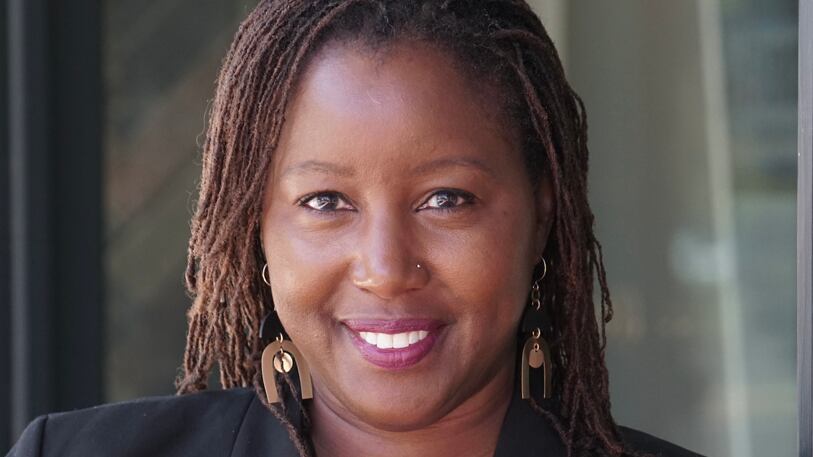Last week, as her short film You Go Girl! was about to premiere at the Sundance Film Festival, Nataki Garrett had another quick appointment. On Jan. 19, the artistic director of the Oregon Shakespeare Festival addressed Congress.
“We’re just pushing them to go ahead and refocus,” Garrett says of the U.S. House of Representatives’ Small Business Committee and its three prospective bills to rebuild the creative economy. “The creative economy is worth more GDP than agriculture and mining combined, so it’s a huge financial loss across the country.”
Congressional testimony, Sundance premieres—these are the high-profile moves that have defined Garrett’s whirlwind, three-year OSF tenure. Stories in The New York Times and Playbill have recognized Garrett as leading the transformation of American theater. She’s the first Black woman to shepherd OSF and one of only a few currently guiding large national companies. Then, there’s the crisis management side. Garrett’s inaugural season in 2020 lasted six days before COVID hit, and she’s “still haunted” by the decision to lay off 500 employees, about half of whom have been gradually rehired.
“OSF doesn’t belong to itself,” Garrett says. “It’s important to this town, to this region. It’s an economic driver. It’s important to the industry. We are a flagship theater. We change the course of the field. From that platform, the rebuild is mostly about, how can we be emblematic of our values? It was humbling these last couple of years.”
After a 2021 that saw OSF embrace virtual reality and other immersive technology, film takes center stage this month as You Go Girl! screens at Sundance through Jan. 30, one of 59 shorts selected from more than 10,000 submissions. Helmed by acclaimed theater director Shariffa Ali, it follows a New York City comedian named Audrey (Tiffany Mann) navigating the physical and spiritual challenges of hiking Mount Ashland alone. Following last year’s Ash Land, this film marks the second of Ali’s OSF shorts exploring Black women’s vulnerability, freedom and catharsis in the Oregon wilderness. Garrett executive-produced both.
“Shariffa Ali uses [Southern Oregon] as a canvas to build on this idea of reconciliation and longing and regeneration,” Garrett says. “It’s a good metaphor for my last three years at OSF.”
When she was hired in April 2019, the Oakland, Calif., native and former artistic director of the Denver Center for the Performing Arts inherited OSF’s national influence, legacy of evolution and years of financial devastation stemming from wildfires and a “huge structural deficit.” The 2022 season begins paving the road to recovery. The company will stage seven live plays beginning in April and debut a new ticketing model with lower prices ($35 to $75) and greater accessibility for Rogue Valley residents.
Though OSF was by no means some traditionalist Globe Theatre tribute troupe before Garrett’s arrival, she has prioritized contemporary artists of color and their work. While Garrett is quick to point out Ashland’s welcoming reception and touching patron feedback, some programming pivots—particularly the 2021 decision to stage only the one-woman Fannie Lou Hamer production Fannie—yielded vitriol. Despite OSF lacking the personnel to safely produce any in-person Shakespeare last year, a group of OSF patrons identifying themselves as the “Old White Guard” (member numbers and all) sent letters suggesting that, as a Black woman, Garrett was merely preaching to the choir with her programming “teaching about racism,” that she didn’t understand Shakespeare and even feared it.
“It actually made me feel really threatened, that I could be harmed for the work that I was doing,” she says. “Even with that, I had to find my humility and use that as motivation. When people write incendiary, racist, sexist language, at the base of it is some fear and longing and a need to be seen.”
This cavalcade of invigorating and gutting experiences in and around Ashland resonates clearly within You Go Girl! The film’s heartbeat shifts between peril and power when Black women carve paths where they’ve historically been absent or unwelcome. Garrett, of course, wants to talk through the art. She’ll direct Dominique Morisseau’s Confederates this autumn and seeks to continue fostering projects like You Go Girl!
“The film says, ‘We’re here. I am rural Southern Oregon. I am my town. I am this area. It’s important that I’m here,’” Garrett says. “‘We belong here, and we also bask in the glory of what it’s like to live here.’”

